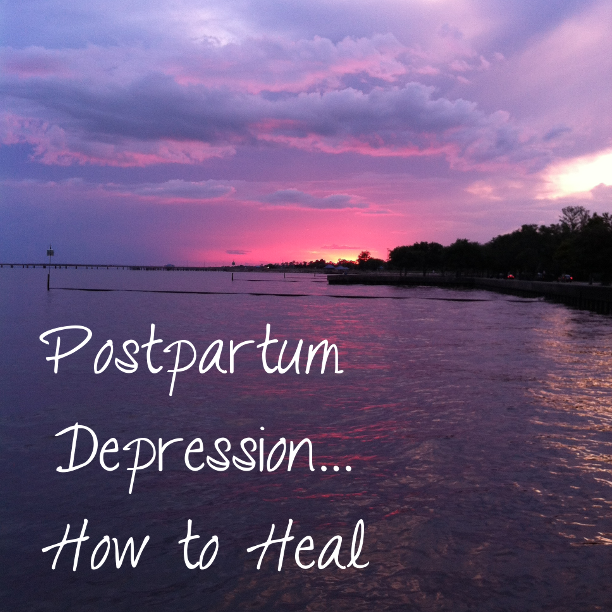I had a beautiful baby. So, why was I crying every day? Why did I feel like I wasn’t worthy of being a mother? Why was my house such a mess? Why was I such a mess? Everyone says that you never know how much you can love someone until you have a child. I didn’t feel that instant connection which made me feel even more guilty and lacking as a mother. To make matters worse, I felt like I couldn’t tell anyone. What would people think of me if I admitted that I didn’t feel head over heals for my child?
As many as 30% of women experience some sort of postpartum mood disorder. According to Postpartum Support International, postpartum depression/anxiety is the most common complication of childbirth. Unfortunately, it seems to be one of those things that we hear a lot about, but are afraid to talk about. And, we certainly don’t plan for it.
So, how do you know that you might have postpartum depression or anxiety and not just the baby blues?
Hormonal changes after childbirth cause the majority of women to have a roller coaster of emotions in the weeks immediately following labor and delivery. Feelings of anger, irritability, sadness, or hopelessness that persist for more than two weeks after childbirth, you may be experiencing a postpartum mood disorder. Most mothers start experiencing symptoms within the first 6 weeks postpartum, but they can appear up to 2 years after you give birth. Symptoms aren’t limited to first-time mothers, either. You might develop a postpartum mood disorder after any of your pregnancies. Severe symptoms like scary, repetitive unwanted thoughts, flashbacks, panic attacks, rapid mood swings or paranoia could be a sign of an even more serious condition. Postpartum Obsessive Compulsive Disorder, Post-Traumatic Stress Disorder, and Psychosis are other mood disorders that require immediate attention (here’s a powerful example.)
What can you do during pregnancy to prepare for the possibility of postpartum depression/anxiety?
One of the first steps you can take is to complete the Edinburgh Postnatal Depression scale. It is a simple, 10-question quiz designed to determine your risk. You can take the scale during your pregnancy to determine your baseline and again every few months after your baby is born to look for changes that may indicate signs of postpartum depression/anxiety.
Another helpful idea is to create a postpartum wellness plan. This consists of preparing for how you will handle many of the common tasks associated with caring for a new child. Consider planning how you will make meals and do grocery shopping, family sleeping arrangements, plans for diapering your baby, care for older siblings, and how to handle visitors. Don’t neglect to prepare for your physical and emotional health after your baby is born, as well.
What should you do if you think you may be experiencing a postpartum mood disorder?
Don’t be afraid or ashamed to talk about it. You may be surprised to find that many of your friends have similar experiences. I waited far too long before addressing my postpartum issues. I wish I had known how normal my feelings really were. With early intervention, most symptoms can be resolved or managed. Start by calling your care provider. He or she will need to rule out other medical conditions such as a thyroid disorder in order to determine whether you have postpartum depression. From there, your doctor may suggest therapy, other support groups, and/or medication.
Self-care is also critical part of helping you work through your feelings. Kristin Hodson, a psychotherapist specializing in pregnancy and postpartum mood disorders, suggests the RESTORE method.
- R: Rest & Relaxation – Try to get as much rest as possible. Yes, this can be very difficult with a new baby, but trying to get sleep in 4-hour blocks are extremely beneficial. This may mean that dad needs to take a night feeding or that you have to go to bed extra early.
- E: Exercise & Sun – Doing some gentle yoga or going for a walk can do wonders for your mood. Making sure that you’re getting some direct sunlight every day helps with your Vitamin D levels which are associated with happiness.
- S: Self-care and Emotion – We all need a little space. Be sure to consistently schedule time for yourself, even if it is only 5 minutes.
- T: Tasks & Family – Do your best to let go of the little things around the house. Develop small routines that make you feel like you are getting a few things done everyday.
- O: Outside Support & Help – Don’t be afraid to ask for help from friends or to seek treatment from medical professionals.
- R: Relationships – Take a few moments each day to bond individually with members of your family. Sing to your new baby or give her an infant massage. Try to find 10 minutes daily to talk to your spouse. Don’t forget to focus on what is going well with your family and your relationship. Schedule date nights or go out to lunch together.
- E: Eat Nutritiously – Be sure that you are drinking plenty of water and eating well. Have ready-made snacks and freezer meals available. Keep a cooler with fruits and veggies near where you will be nursing or feeding your baby so that you always have a healthy snack to grab quickly.


- Postpartum Support International (www.postpartum.net)
- MedEd PPD (mededppd.org)
- Postpartum Progess (www.postpartumprogress.com)
- The Healing Group (www.thehealinggroup.com)
The weeks and months after you have a baby can be stressful and even scary. Experiencing postpartum depression or anxiety amplifies all of these feelings. But, remember that it is normal and you can get help. Don’t be afraid to talk about your feelings. With self care and some outside support, you will be on your way to a much more enjoyable mommyhood.
Read Part 1 of this topic from guest blogger, Karen, right here.




















Thank you so much for all of this info! I’ve also found a postpartum depression support group that meets monthly in Zachry. I hadn’t attended before submitting my post, but went in February and it felt great to be around moms who could relate. Here’s the info: http://m.lanermc.org/Events/EventsDisplay.asp?p1=7084&p2=Y&Sort=&Archive
Thank you so much for opening up and sharing, Ashley. I experience regular old-fashioned depression and it can be so isolating. In glad you got help and are able to share what you learned.
Thank you for sharing this! I struggled with Postpartum Anxiety and it was NO FUN! I am so glad it is behind me, and I think part of my path to healing was the post I did at NOMB last year. I think once I wrote it all out, it made me feel so much better!
Having someone to talk to makes a world of difference, too!!!